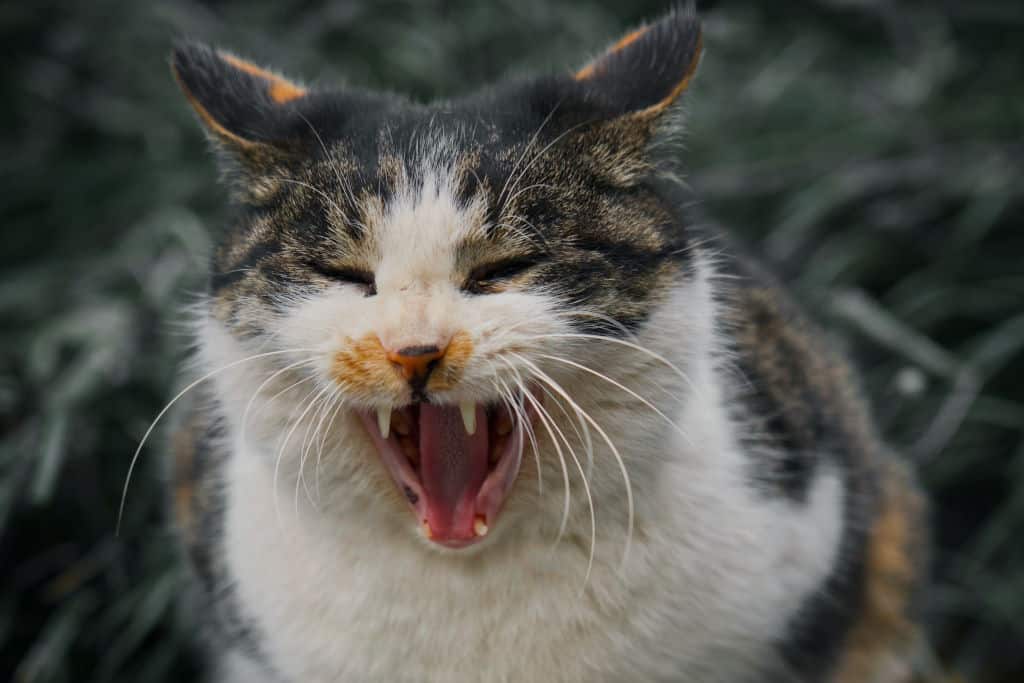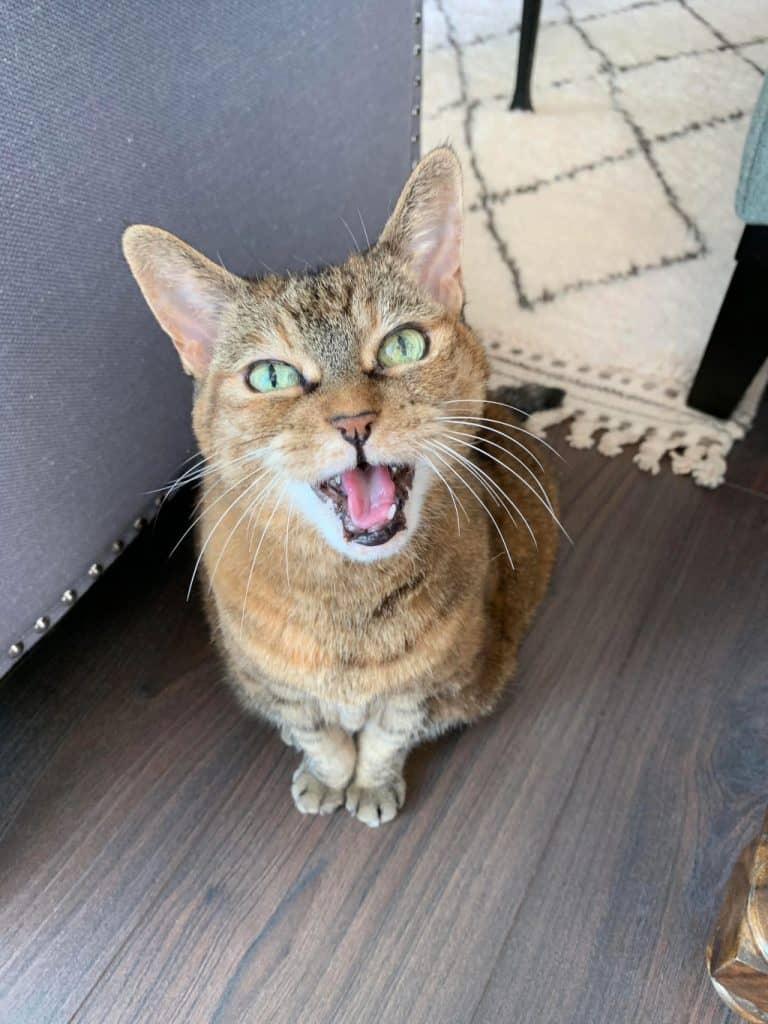Disclosure: We may earn a commission from helpful, relevant links in our content. No cost to you. See our privacy policy.
There are many reasons why a stray cat may be howling at night.
If the stray is a female cat, she may be howling to attract a male to mate. If it’s a male cat, he may be yowling to warn off others and protect his territory. If the stray cat is partly socialized, they may also meow at humans to give them food or let them in.
This article explores why stray cats meow and what you can do about it.

Why Do Stray Cats Sometimes Yowl Outside Your House?
There are several possible reasons why a stray cat might be yowling at night outside your window, and it could be either a male or a female cat:
- Territorial Dominance. Stray cats crying at night often aim to establish territory dominance, asserting themselves as the ruling feline of the area. Typically, it’s a male cat howling, especially if another cat is prowling in his territory. This yowling could indicate intrigue or frustration due to his inability to interact or defend his area.
- Mating Season. Depending on your location, it could be cat mating season. Cats are “seasonal” breeders, with females typically becoming pregnant in the spring and fall. Cats crying at night during these seasons is a natural phenomenon. The loud and incessant nature of their calls can be distressing for the neighborhood.
- In Heat or Hormonal Changes. While only female cats go into heat, male cats can detect female pheromones. This detection can trigger excessive hormone production, making them more aggressive and leading them to howl to attract a nearby female.
- Requesting Food. Some stray cats may not yowl but will meow at humans to ask for food. Once fed, these strays might gather in larger numbers, potentially causing issues for homeowners and their pets. While feeding strays might seem ethical, it often creates more problems than it solves.
- Seeking Human Attention. If a cat, especially a somewhat socialized one, meows at you, it might be seeking attention. Adult cats don’t meow at each other, as this interaction is primarily reserved for humans. Mothers meow to their kittens, so when an adult cat communicates this way, it’s an attempt to connect with you.
- Environmental Changes or Threats. Sometimes, sudden changes in their environment or potential threats like larger animals or loud noises might prompt cats to vocalize more, signaling their discomfort or alarm.
Whichever the reason, there are always a few things you can do to end this, and help yourself and the cat, as well. Keep reading to find out what you can do about this problem.
What to Do When You Hear Stray Cats Howling During Night?
If you want, get the cat somewhere safe for the night. Take the cat in and place them in a room with a closed door.
Don’t share your current cats’ food bowls, litter boxes, or scoops with stray cats. This helps to keep disease at bay.
In the morning, contact some of your local cat shelters and rescues. If the stray appears friendly, inquire whether the shelter has a microchip scanner to scan the cat. They could be chipped, and the owner is looking for them.
Take a look at the cat’s ears. If they have a little tip cut off, it could mean the cat is fixed, has had at least one rabies shot, and may be cared for by someone. When you call the rescues, ask them if they know anyone performing trap neuter release (TNR) on your street.
If you have some outdoor space, you can construct a cat house. Some of them are pretty easy to make, with easy instructions. Many cat houses can be built or purchased directly from Chewy or Amazon.

How Do You Silence Stray Cat Yowling?
There’s not much you can do about silencing the strays other than taking them in or chasing them away. Taking a stray is not always safe, but chasing it may not be kind.
However, there are humane ways to deter animals from your property, especially if you own a cat: motion-activated water sprinklers, air-emitting cans to scare them off, and so on. A more humane way is to spray your property with citrus scents. Most cats dislike citrus in any form.
Lavender, rosemary, and peppermint are also scents that cats tend to avoid. Strategically placing these around your garden can deter night-time visitors, cutting down on the nocturnal concerts.
Placing these deterrents around your property may discourage strays from approaching close enough to be heard. Remember that your own cats will thank you for keeping these “intruders” out of their territory. You’ll also be avoiding a potential attack from a stray.
How to Tell if It’s Safe to Adopt the Yowling Stray?
If the stray cat allows at least some mild touch, it’s partially socialized. Otherwise, the cat isn’t yet socialized, and you should proceed carefully. An unsocialized cat might approach but avoids touch, and a fully unsocialized one avoids touch and won’t approach either.
Typically, socialized cats will approach and show signs of being comfortable around people. Unsocialized cats will not come close and show signs of discomfort with people.
A somewhat socialized stray will meow, approach, allow the touch, raise the tail, and retail a relaxed posture. She may even purr, rub against you, play, and expose her stomach.
All of these are good signs showing you that the cat won’t be a big problem and that you could take it in and take care of it. Keep in mind the stray needs to be separated from your current cats, and you should take it to the vet for a checkup.
Remember that not all cats need to be inside and sleep on a bed to be happy, but it is usually a better option. However, avoid imposing your ideal cat lifestyle on a stray cat. You can adopt and care for them while allowing them to come and go as they please.
That being said, the best way to catch the cat to be examined by a vet is to let them walk into the transport box rather than grab and push them into it.
Also, remember that some cats need to be socialized to be happy indoors. If you cannot provide her with an appropriate indoor/outdoor lifestyle, give her up to a family in need of a barn cat. That way, she gets some fresh air and a warm place to stay.
FAQs
Do stray cats yowl because of loneliness?
Stray cats don’t typically yowl because of loneliness but because they’re either in heat, trying to mate, or protecting their territory. Strays aren’t always socialized, so they aren’t typically behaving as indoors when you leave them alone. The wilder they are, the less lonely they get.
Why would your own cat howl at night?
There could be several reasons why your cat is howling. It can represent hunger, thirst, loneliness, or even health issues. Your cat may also be bored and unstimulated due to a lack of exercise, or she may want to go outside, which you should probably avoid allowing.
Is it safe to take the howling feral cat to a shelter?
If you bring feral cats or kittens to a shelter, they may be euthanized (killed). Because feral cats are unsocialized, the shelter considers them “unadoptable” and does not even show them to the public. Feral cat relocation should only be used as a last resort.
Alex, a passionate animal lover, has experience in training and understanding animal behavior. As a proud pet parent to two dogs and three cats, he founded AnimalReport.net to share insights from animal experts and expand his knowledge of the animal kingdom.




